NUR1100 - Caring Theories: A Reflective Essay on Nursing Practice
VerifiedAdded on 2023/04/08
|9
|1884
|427
Essay
AI Summary
This essay provides a personal reflection on the application of caring theories in nursing practice, focusing on an experience with a patient named Sarah. It explores the importance of empathy, therapeutic communication, and person-centered care, drawing upon Jean Watson's theory of caring and the NMBA standards of practice. The author reflects on a shift in understanding, recognizing the need to address the psychological and social aspects of patient health in addition to the biological. The essay highlights the significance of building a therapeutic relationship with patients, fostering trust, and empowering them to actively participate in their care, leading to improved health outcomes and patient satisfaction. The reflection emphasizes the importance of integrating caring principles into future nursing practice, prioritizing both physical interventions and the establishment of strong emotional connections with patients.
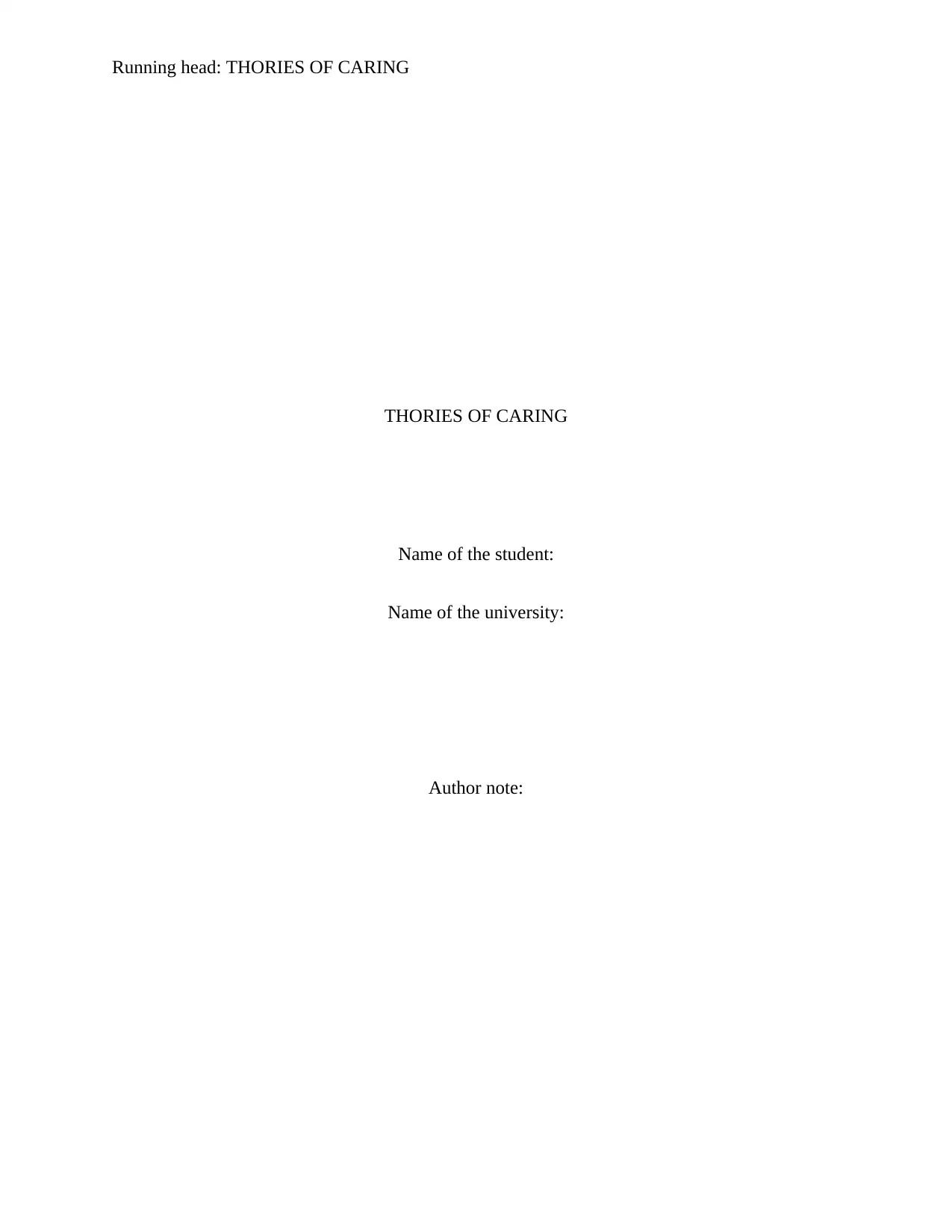
Running head: THORIES OF CARING
THORIES OF CARING
Name of the student:
Name of the university:
Author note:
THORIES OF CARING
Name of the student:
Name of the university:
Author note:
Paraphrase This Document
Need a fresh take? Get an instant paraphrase of this document with our AI Paraphraser
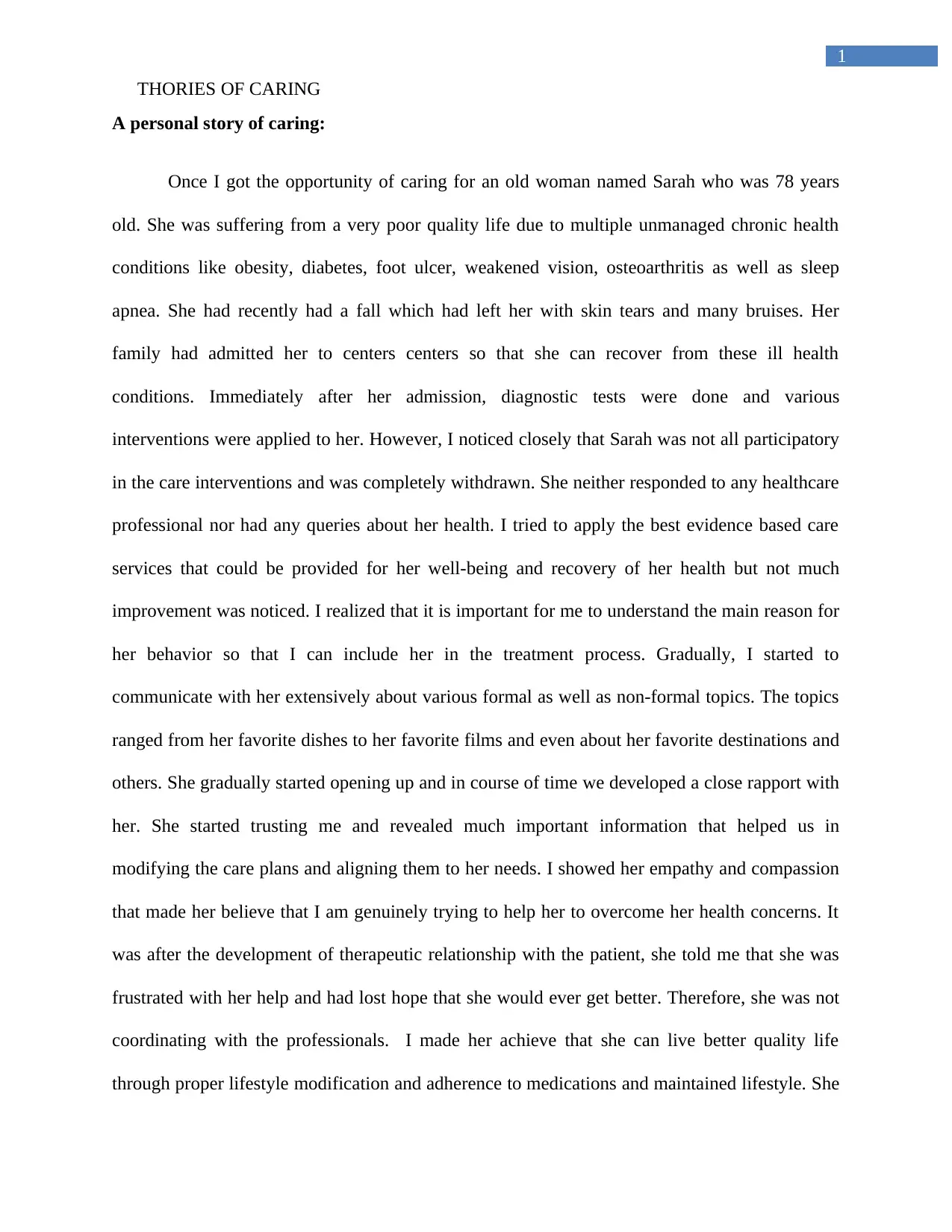
1
THORIES OF CARING
A personal story of caring:
Once I got the opportunity of caring for an old woman named Sarah who was 78 years
old. She was suffering from a very poor quality life due to multiple unmanaged chronic health
conditions like obesity, diabetes, foot ulcer, weakened vision, osteoarthritis as well as sleep
apnea. She had recently had a fall which had left her with skin tears and many bruises. Her
family had admitted her to centers centers so that she can recover from these ill health
conditions. Immediately after her admission, diagnostic tests were done and various
interventions were applied to her. However, I noticed closely that Sarah was not all participatory
in the care interventions and was completely withdrawn. She neither responded to any healthcare
professional nor had any queries about her health. I tried to apply the best evidence based care
services that could be provided for her well-being and recovery of her health but not much
improvement was noticed. I realized that it is important for me to understand the main reason for
her behavior so that I can include her in the treatment process. Gradually, I started to
communicate with her extensively about various formal as well as non-formal topics. The topics
ranged from her favorite dishes to her favorite films and even about her favorite destinations and
others. She gradually started opening up and in course of time we developed a close rapport with
her. She started trusting me and revealed much important information that helped us in
modifying the care plans and aligning them to her needs. I showed her empathy and compassion
that made her believe that I am genuinely trying to help her to overcome her health concerns. It
was after the development of therapeutic relationship with the patient, she told me that she was
frustrated with her help and had lost hope that she would ever get better. Therefore, she was not
coordinating with the professionals. I made her achieve that she can live better quality life
through proper lifestyle modification and adherence to medications and maintained lifestyle. She
THORIES OF CARING
A personal story of caring:
Once I got the opportunity of caring for an old woman named Sarah who was 78 years
old. She was suffering from a very poor quality life due to multiple unmanaged chronic health
conditions like obesity, diabetes, foot ulcer, weakened vision, osteoarthritis as well as sleep
apnea. She had recently had a fall which had left her with skin tears and many bruises. Her
family had admitted her to centers centers so that she can recover from these ill health
conditions. Immediately after her admission, diagnostic tests were done and various
interventions were applied to her. However, I noticed closely that Sarah was not all participatory
in the care interventions and was completely withdrawn. She neither responded to any healthcare
professional nor had any queries about her health. I tried to apply the best evidence based care
services that could be provided for her well-being and recovery of her health but not much
improvement was noticed. I realized that it is important for me to understand the main reason for
her behavior so that I can include her in the treatment process. Gradually, I started to
communicate with her extensively about various formal as well as non-formal topics. The topics
ranged from her favorite dishes to her favorite films and even about her favorite destinations and
others. She gradually started opening up and in course of time we developed a close rapport with
her. She started trusting me and revealed much important information that helped us in
modifying the care plans and aligning them to her needs. I showed her empathy and compassion
that made her believe that I am genuinely trying to help her to overcome her health concerns. It
was after the development of therapeutic relationship with the patient, she told me that she was
frustrated with her help and had lost hope that she would ever get better. Therefore, she was not
coordinating with the professionals. I made her achieve that she can live better quality life
through proper lifestyle modification and adherence to medications and maintained lifestyle. She
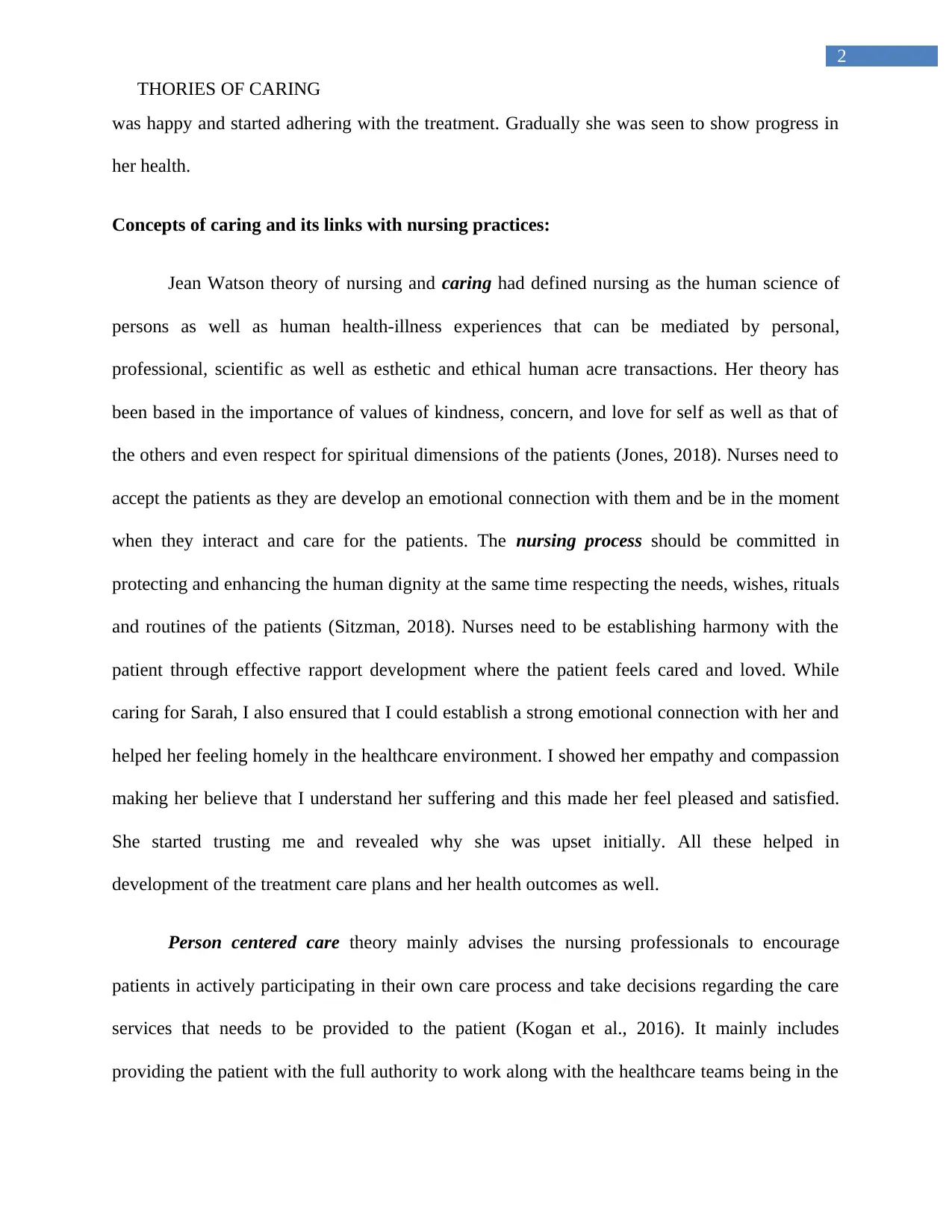
2
THORIES OF CARING
was happy and started adhering with the treatment. Gradually she was seen to show progress in
her health.
Concepts of caring and its links with nursing practices:
Jean Watson theory of nursing and caring had defined nursing as the human science of
persons as well as human health-illness experiences that can be mediated by personal,
professional, scientific as well as esthetic and ethical human acre transactions. Her theory has
been based in the importance of values of kindness, concern, and love for self as well as that of
the others and even respect for spiritual dimensions of the patients (Jones, 2018). Nurses need to
accept the patients as they are develop an emotional connection with them and be in the moment
when they interact and care for the patients. The nursing process should be committed in
protecting and enhancing the human dignity at the same time respecting the needs, wishes, rituals
and routines of the patients (Sitzman, 2018). Nurses need to be establishing harmony with the
patient through effective rapport development where the patient feels cared and loved. While
caring for Sarah, I also ensured that I could establish a strong emotional connection with her and
helped her feeling homely in the healthcare environment. I showed her empathy and compassion
making her believe that I understand her suffering and this made her feel pleased and satisfied.
She started trusting me and revealed why she was upset initially. All these helped in
development of the treatment care plans and her health outcomes as well.
Person centered care theory mainly advises the nursing professionals to encourage
patients in actively participating in their own care process and take decisions regarding the care
services that needs to be provided to the patient (Kogan et al., 2016). It mainly includes
providing the patient with the full authority to work along with the healthcare teams being in the
THORIES OF CARING
was happy and started adhering with the treatment. Gradually she was seen to show progress in
her health.
Concepts of caring and its links with nursing practices:
Jean Watson theory of nursing and caring had defined nursing as the human science of
persons as well as human health-illness experiences that can be mediated by personal,
professional, scientific as well as esthetic and ethical human acre transactions. Her theory has
been based in the importance of values of kindness, concern, and love for self as well as that of
the others and even respect for spiritual dimensions of the patients (Jones, 2018). Nurses need to
accept the patients as they are develop an emotional connection with them and be in the moment
when they interact and care for the patients. The nursing process should be committed in
protecting and enhancing the human dignity at the same time respecting the needs, wishes, rituals
and routines of the patients (Sitzman, 2018). Nurses need to be establishing harmony with the
patient through effective rapport development where the patient feels cared and loved. While
caring for Sarah, I also ensured that I could establish a strong emotional connection with her and
helped her feeling homely in the healthcare environment. I showed her empathy and compassion
making her believe that I understand her suffering and this made her feel pleased and satisfied.
She started trusting me and revealed why she was upset initially. All these helped in
development of the treatment care plans and her health outcomes as well.
Person centered care theory mainly advises the nursing professionals to encourage
patients in actively participating in their own care process and take decisions regarding the care
services that needs to be provided to the patient (Kogan et al., 2016). It mainly includes
providing the patient with the full authority to work along with the healthcare teams being in the
⊘ This is a preview!⊘
Do you want full access?
Subscribe today to unlock all pages.

Trusted by 1+ million students worldwide
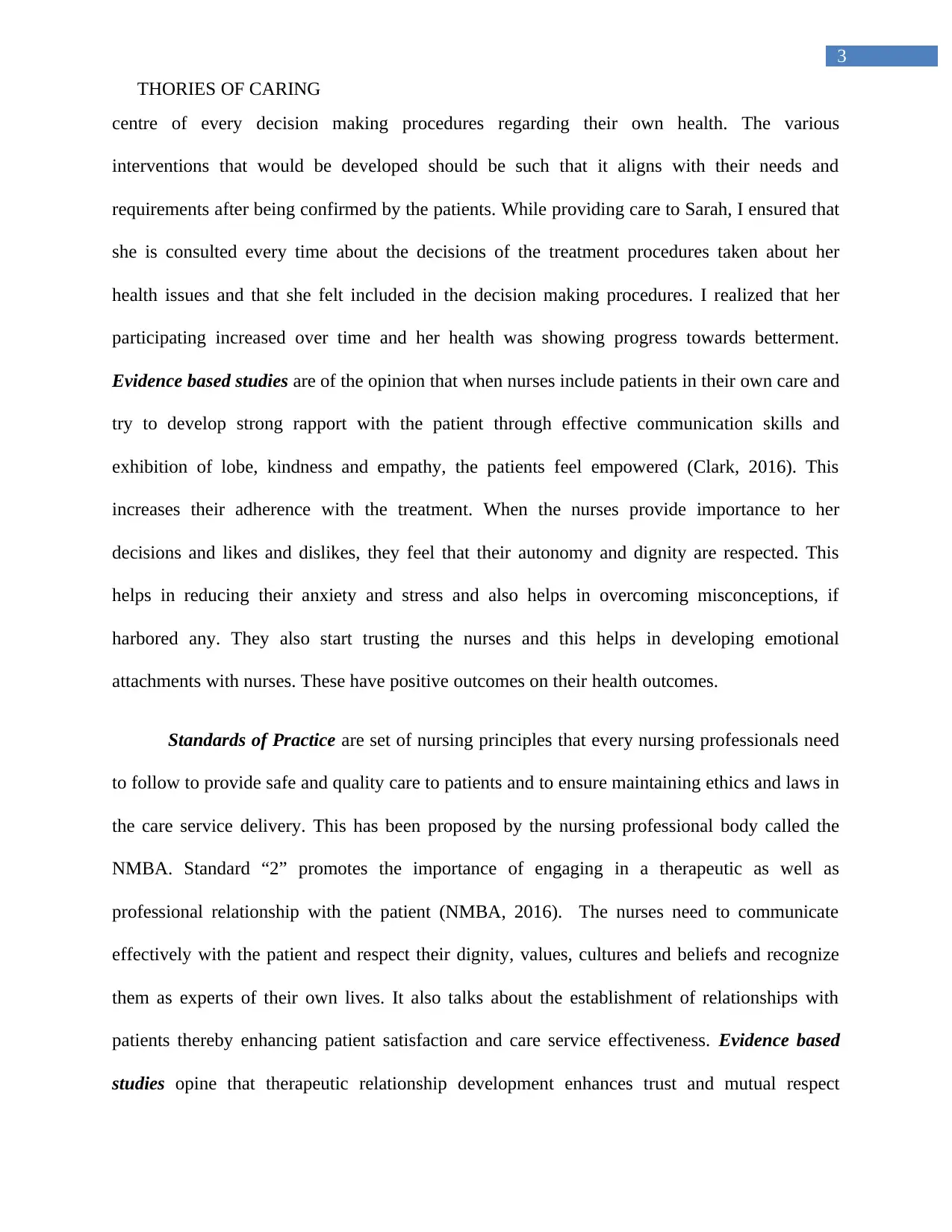
3
THORIES OF CARING
centre of every decision making procedures regarding their own health. The various
interventions that would be developed should be such that it aligns with their needs and
requirements after being confirmed by the patients. While providing care to Sarah, I ensured that
she is consulted every time about the decisions of the treatment procedures taken about her
health issues and that she felt included in the decision making procedures. I realized that her
participating increased over time and her health was showing progress towards betterment.
Evidence based studies are of the opinion that when nurses include patients in their own care and
try to develop strong rapport with the patient through effective communication skills and
exhibition of lobe, kindness and empathy, the patients feel empowered (Clark, 2016). This
increases their adherence with the treatment. When the nurses provide importance to her
decisions and likes and dislikes, they feel that their autonomy and dignity are respected. This
helps in reducing their anxiety and stress and also helps in overcoming misconceptions, if
harbored any. They also start trusting the nurses and this helps in developing emotional
attachments with nurses. These have positive outcomes on their health outcomes.
Standards of Practice are set of nursing principles that every nursing professionals need
to follow to provide safe and quality care to patients and to ensure maintaining ethics and laws in
the care service delivery. This has been proposed by the nursing professional body called the
NMBA. Standard “2” promotes the importance of engaging in a therapeutic as well as
professional relationship with the patient (NMBA, 2016). The nurses need to communicate
effectively with the patient and respect their dignity, values, cultures and beliefs and recognize
them as experts of their own lives. It also talks about the establishment of relationships with
patients thereby enhancing patient satisfaction and care service effectiveness. Evidence based
studies opine that therapeutic relationship development enhances trust and mutual respect
THORIES OF CARING
centre of every decision making procedures regarding their own health. The various
interventions that would be developed should be such that it aligns with their needs and
requirements after being confirmed by the patients. While providing care to Sarah, I ensured that
she is consulted every time about the decisions of the treatment procedures taken about her
health issues and that she felt included in the decision making procedures. I realized that her
participating increased over time and her health was showing progress towards betterment.
Evidence based studies are of the opinion that when nurses include patients in their own care and
try to develop strong rapport with the patient through effective communication skills and
exhibition of lobe, kindness and empathy, the patients feel empowered (Clark, 2016). This
increases their adherence with the treatment. When the nurses provide importance to her
decisions and likes and dislikes, they feel that their autonomy and dignity are respected. This
helps in reducing their anxiety and stress and also helps in overcoming misconceptions, if
harbored any. They also start trusting the nurses and this helps in developing emotional
attachments with nurses. These have positive outcomes on their health outcomes.
Standards of Practice are set of nursing principles that every nursing professionals need
to follow to provide safe and quality care to patients and to ensure maintaining ethics and laws in
the care service delivery. This has been proposed by the nursing professional body called the
NMBA. Standard “2” promotes the importance of engaging in a therapeutic as well as
professional relationship with the patient (NMBA, 2016). The nurses need to communicate
effectively with the patient and respect their dignity, values, cultures and beliefs and recognize
them as experts of their own lives. It also talks about the establishment of relationships with
patients thereby enhancing patient satisfaction and care service effectiveness. Evidence based
studies opine that therapeutic relationship development enhances trust and mutual respect
Paraphrase This Document
Need a fresh take? Get an instant paraphrase of this document with our AI Paraphraser
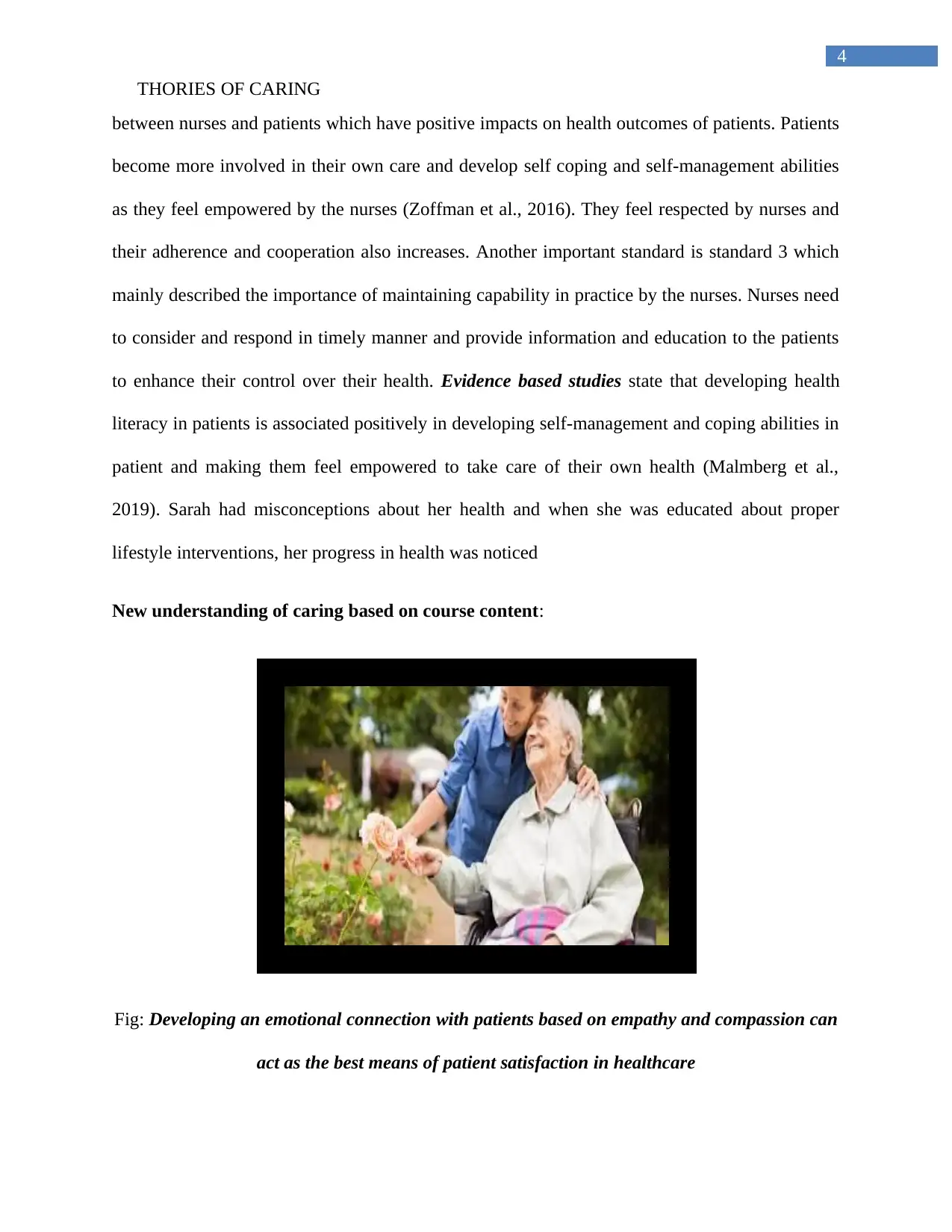
4
THORIES OF CARING
between nurses and patients which have positive impacts on health outcomes of patients. Patients
become more involved in their own care and develop self coping and self-management abilities
as they feel empowered by the nurses (Zoffman et al., 2016). They feel respected by nurses and
their adherence and cooperation also increases. Another important standard is standard 3 which
mainly described the importance of maintaining capability in practice by the nurses. Nurses need
to consider and respond in timely manner and provide information and education to the patients
to enhance their control over their health. Evidence based studies state that developing health
literacy in patients is associated positively in developing self-management and coping abilities in
patient and making them feel empowered to take care of their own health (Malmberg et al.,
2019). Sarah had misconceptions about her health and when she was educated about proper
lifestyle interventions, her progress in health was noticed
New understanding of caring based on course content:
Fig: Developing an emotional connection with patients based on empathy and compassion can
act as the best means of patient satisfaction in healthcare
THORIES OF CARING
between nurses and patients which have positive impacts on health outcomes of patients. Patients
become more involved in their own care and develop self coping and self-management abilities
as they feel empowered by the nurses (Zoffman et al., 2016). They feel respected by nurses and
their adherence and cooperation also increases. Another important standard is standard 3 which
mainly described the importance of maintaining capability in practice by the nurses. Nurses need
to consider and respond in timely manner and provide information and education to the patients
to enhance their control over their health. Evidence based studies state that developing health
literacy in patients is associated positively in developing self-management and coping abilities in
patient and making them feel empowered to take care of their own health (Malmberg et al.,
2019). Sarah had misconceptions about her health and when she was educated about proper
lifestyle interventions, her progress in health was noticed
New understanding of caring based on course content:
Fig: Developing an emotional connection with patients based on empathy and compassion can
act as the best means of patient satisfaction in healthcare
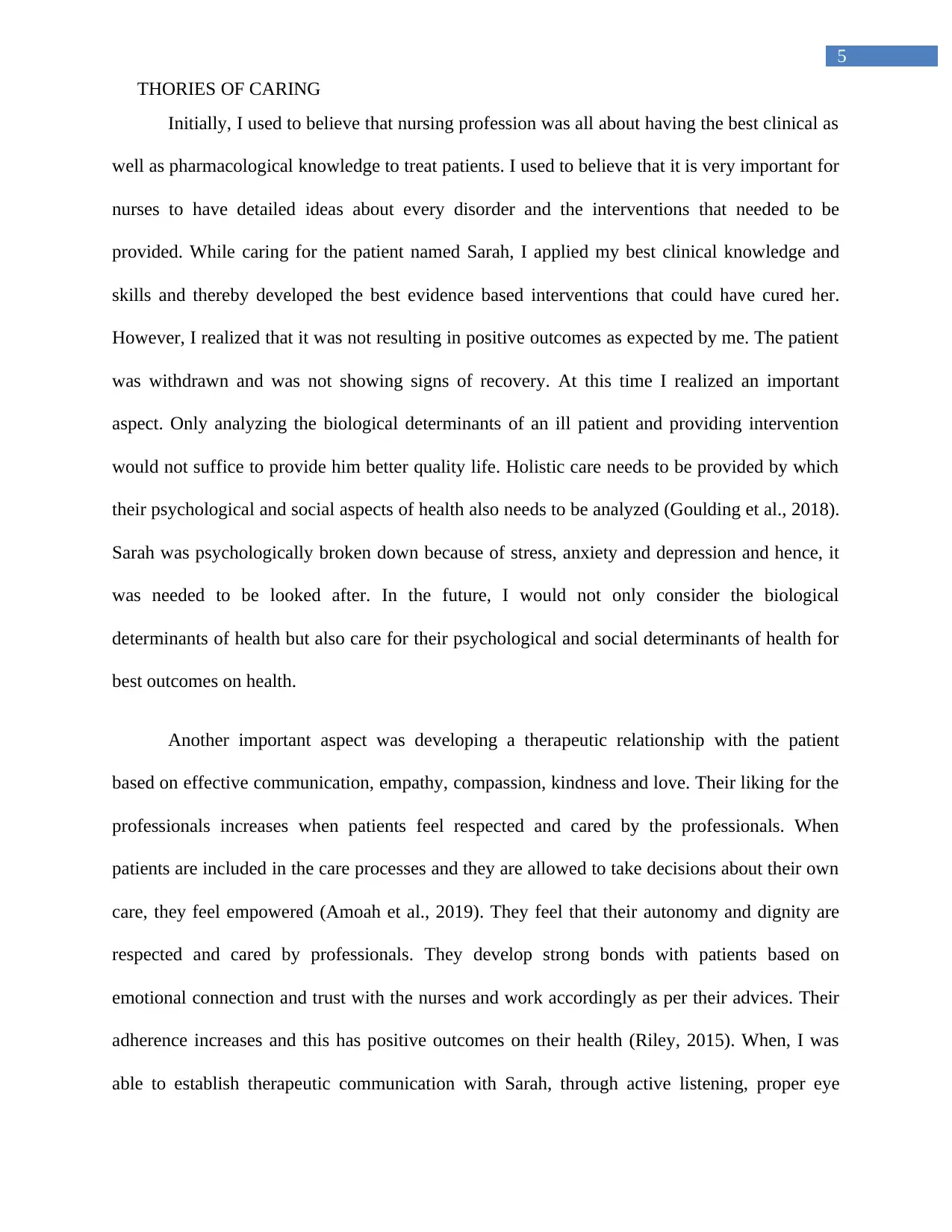
5
THORIES OF CARING
Initially, I used to believe that nursing profession was all about having the best clinical as
well as pharmacological knowledge to treat patients. I used to believe that it is very important for
nurses to have detailed ideas about every disorder and the interventions that needed to be
provided. While caring for the patient named Sarah, I applied my best clinical knowledge and
skills and thereby developed the best evidence based interventions that could have cured her.
However, I realized that it was not resulting in positive outcomes as expected by me. The patient
was withdrawn and was not showing signs of recovery. At this time I realized an important
aspect. Only analyzing the biological determinants of an ill patient and providing intervention
would not suffice to provide him better quality life. Holistic care needs to be provided by which
their psychological and social aspects of health also needs to be analyzed (Goulding et al., 2018).
Sarah was psychologically broken down because of stress, anxiety and depression and hence, it
was needed to be looked after. In the future, I would not only consider the biological
determinants of health but also care for their psychological and social determinants of health for
best outcomes on health.
Another important aspect was developing a therapeutic relationship with the patient
based on effective communication, empathy, compassion, kindness and love. Their liking for the
professionals increases when patients feel respected and cared by the professionals. When
patients are included in the care processes and they are allowed to take decisions about their own
care, they feel empowered (Amoah et al., 2019). They feel that their autonomy and dignity are
respected and cared by professionals. They develop strong bonds with patients based on
emotional connection and trust with the nurses and work accordingly as per their advices. Their
adherence increases and this has positive outcomes on their health (Riley, 2015). When, I was
able to establish therapeutic communication with Sarah, through active listening, proper eye
THORIES OF CARING
Initially, I used to believe that nursing profession was all about having the best clinical as
well as pharmacological knowledge to treat patients. I used to believe that it is very important for
nurses to have detailed ideas about every disorder and the interventions that needed to be
provided. While caring for the patient named Sarah, I applied my best clinical knowledge and
skills and thereby developed the best evidence based interventions that could have cured her.
However, I realized that it was not resulting in positive outcomes as expected by me. The patient
was withdrawn and was not showing signs of recovery. At this time I realized an important
aspect. Only analyzing the biological determinants of an ill patient and providing intervention
would not suffice to provide him better quality life. Holistic care needs to be provided by which
their psychological and social aspects of health also needs to be analyzed (Goulding et al., 2018).
Sarah was psychologically broken down because of stress, anxiety and depression and hence, it
was needed to be looked after. In the future, I would not only consider the biological
determinants of health but also care for their psychological and social determinants of health for
best outcomes on health.
Another important aspect was developing a therapeutic relationship with the patient
based on effective communication, empathy, compassion, kindness and love. Their liking for the
professionals increases when patients feel respected and cared by the professionals. When
patients are included in the care processes and they are allowed to take decisions about their own
care, they feel empowered (Amoah et al., 2019). They feel that their autonomy and dignity are
respected and cared by professionals. They develop strong bonds with patients based on
emotional connection and trust with the nurses and work accordingly as per their advices. Their
adherence increases and this has positive outcomes on their health (Riley, 2015). When, I was
able to establish therapeutic communication with Sarah, through active listening, proper eye
⊘ This is a preview!⊘
Do you want full access?
Subscribe today to unlock all pages.

Trusted by 1+ million students worldwide
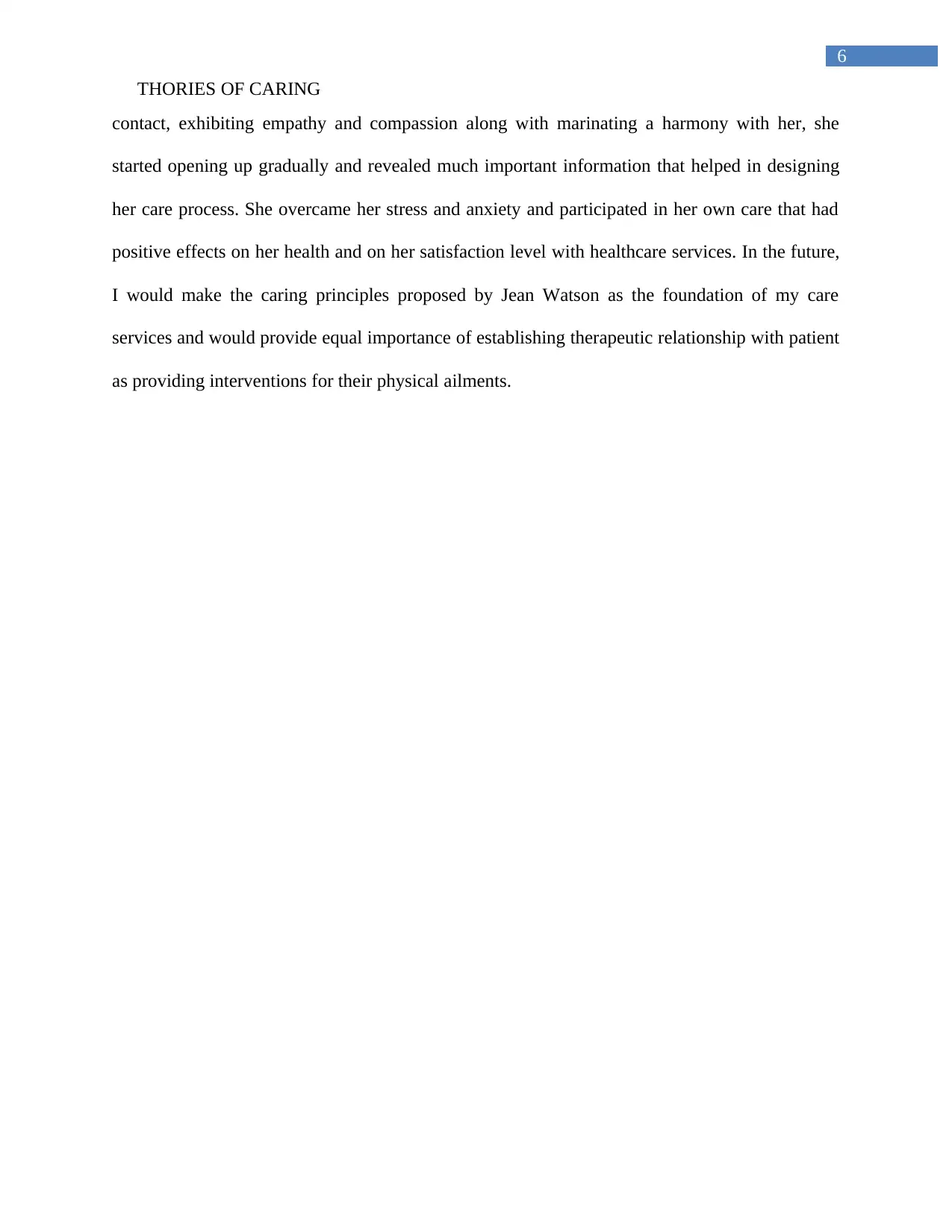
6
THORIES OF CARING
contact, exhibiting empathy and compassion along with marinating a harmony with her, she
started opening up gradually and revealed much important information that helped in designing
her care process. She overcame her stress and anxiety and participated in her own care that had
positive effects on her health and on her satisfaction level with healthcare services. In the future,
I would make the caring principles proposed by Jean Watson as the foundation of my care
services and would provide equal importance of establishing therapeutic relationship with patient
as providing interventions for their physical ailments.
THORIES OF CARING
contact, exhibiting empathy and compassion along with marinating a harmony with her, she
started opening up gradually and revealed much important information that helped in designing
her care process. She overcame her stress and anxiety and participated in her own care that had
positive effects on her health and on her satisfaction level with healthcare services. In the future,
I would make the caring principles proposed by Jean Watson as the foundation of my care
services and would provide equal importance of establishing therapeutic relationship with patient
as providing interventions for their physical ailments.
Paraphrase This Document
Need a fresh take? Get an instant paraphrase of this document with our AI Paraphraser
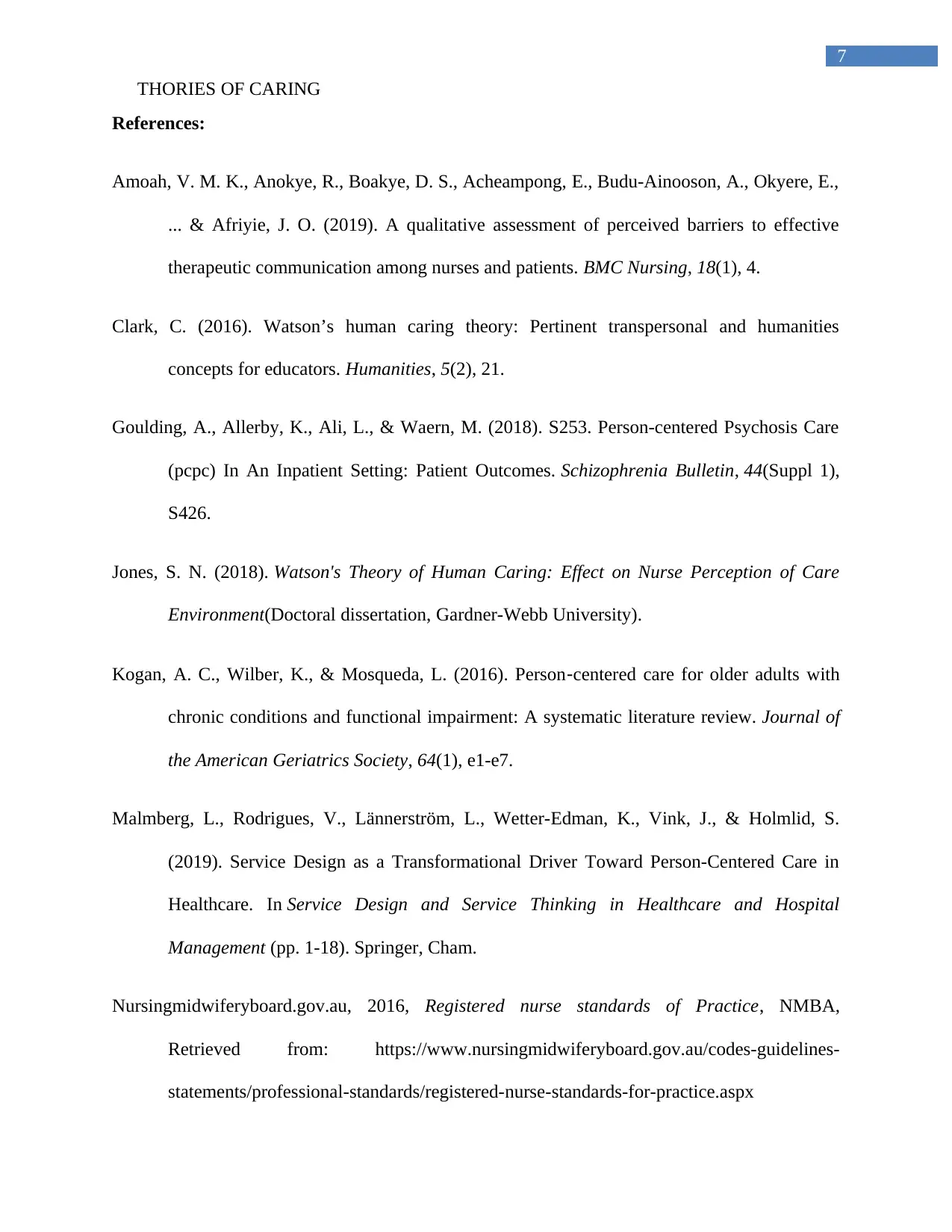
7
THORIES OF CARING
References:
Amoah, V. M. K., Anokye, R., Boakye, D. S., Acheampong, E., Budu-Ainooson, A., Okyere, E.,
... & Afriyie, J. O. (2019). A qualitative assessment of perceived barriers to effective
therapeutic communication among nurses and patients. BMC Nursing, 18(1), 4.
Clark, C. (2016). Watson’s human caring theory: Pertinent transpersonal and humanities
concepts for educators. Humanities, 5(2), 21.
Goulding, A., Allerby, K., Ali, L., & Waern, M. (2018). S253. Person-centered Psychosis Care
(pcpc) In An Inpatient Setting: Patient Outcomes. Schizophrenia Bulletin, 44(Suppl 1),
S426.
Jones, S. N. (2018). Watson's Theory of Human Caring: Effect on Nurse Perception of Care
Environment(Doctoral dissertation, Gardner-Webb University).
Kogan, A. C., Wilber, K., & Mosqueda, L. (2016). Person‐centered care for older adults with
chronic conditions and functional impairment: A systematic literature review. Journal of
the American Geriatrics Society, 64(1), e1-e7.
Malmberg, L., Rodrigues, V., Lännerström, L., Wetter-Edman, K., Vink, J., & Holmlid, S.
(2019). Service Design as a Transformational Driver Toward Person-Centered Care in
Healthcare. In Service Design and Service Thinking in Healthcare and Hospital
Management (pp. 1-18). Springer, Cham.
Nursingmidwiferyboard.gov.au, 2016, Registered nurse standards of Practice, NMBA,
Retrieved from: https://www.nursingmidwiferyboard.gov.au/codes-guidelines-
statements/professional-standards/registered-nurse-standards-for-practice.aspx
THORIES OF CARING
References:
Amoah, V. M. K., Anokye, R., Boakye, D. S., Acheampong, E., Budu-Ainooson, A., Okyere, E.,
... & Afriyie, J. O. (2019). A qualitative assessment of perceived barriers to effective
therapeutic communication among nurses and patients. BMC Nursing, 18(1), 4.
Clark, C. (2016). Watson’s human caring theory: Pertinent transpersonal and humanities
concepts for educators. Humanities, 5(2), 21.
Goulding, A., Allerby, K., Ali, L., & Waern, M. (2018). S253. Person-centered Psychosis Care
(pcpc) In An Inpatient Setting: Patient Outcomes. Schizophrenia Bulletin, 44(Suppl 1),
S426.
Jones, S. N. (2018). Watson's Theory of Human Caring: Effect on Nurse Perception of Care
Environment(Doctoral dissertation, Gardner-Webb University).
Kogan, A. C., Wilber, K., & Mosqueda, L. (2016). Person‐centered care for older adults with
chronic conditions and functional impairment: A systematic literature review. Journal of
the American Geriatrics Society, 64(1), e1-e7.
Malmberg, L., Rodrigues, V., Lännerström, L., Wetter-Edman, K., Vink, J., & Holmlid, S.
(2019). Service Design as a Transformational Driver Toward Person-Centered Care in
Healthcare. In Service Design and Service Thinking in Healthcare and Hospital
Management (pp. 1-18). Springer, Cham.
Nursingmidwiferyboard.gov.au, 2016, Registered nurse standards of Practice, NMBA,
Retrieved from: https://www.nursingmidwiferyboard.gov.au/codes-guidelines-
statements/professional-standards/registered-nurse-standards-for-practice.aspx
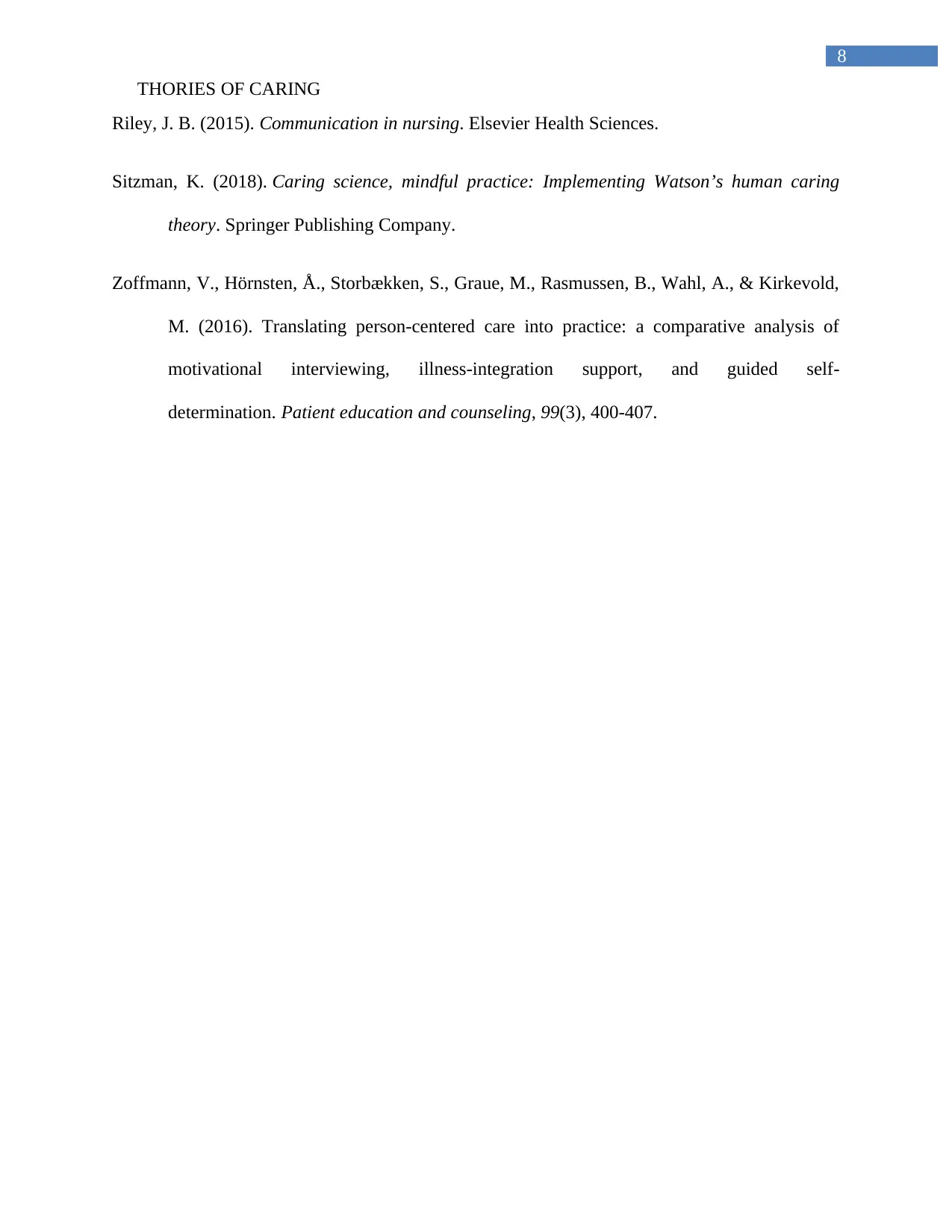
8
THORIES OF CARING
Riley, J. B. (2015). Communication in nursing. Elsevier Health Sciences.
Sitzman, K. (2018). Caring science, mindful practice: Implementing Watson’s human caring
theory. Springer Publishing Company.
Zoffmann, V., Hörnsten, Å., Storbækken, S., Graue, M., Rasmussen, B., Wahl, A., & Kirkevold,
M. (2016). Translating person-centered care into practice: a comparative analysis of
motivational interviewing, illness-integration support, and guided self-
determination. Patient education and counseling, 99(3), 400-407.
THORIES OF CARING
Riley, J. B. (2015). Communication in nursing. Elsevier Health Sciences.
Sitzman, K. (2018). Caring science, mindful practice: Implementing Watson’s human caring
theory. Springer Publishing Company.
Zoffmann, V., Hörnsten, Å., Storbækken, S., Graue, M., Rasmussen, B., Wahl, A., & Kirkevold,
M. (2016). Translating person-centered care into practice: a comparative analysis of
motivational interviewing, illness-integration support, and guided self-
determination. Patient education and counseling, 99(3), 400-407.
⊘ This is a preview!⊘
Do you want full access?
Subscribe today to unlock all pages.

Trusted by 1+ million students worldwide
1 out of 9
Related Documents
Your All-in-One AI-Powered Toolkit for Academic Success.
+13062052269
info@desklib.com
Available 24*7 on WhatsApp / Email
![[object Object]](/_next/static/media/star-bottom.7253800d.svg)
Unlock your academic potential
Copyright © 2020–2026 A2Z Services. All Rights Reserved. Developed and managed by ZUCOL.





